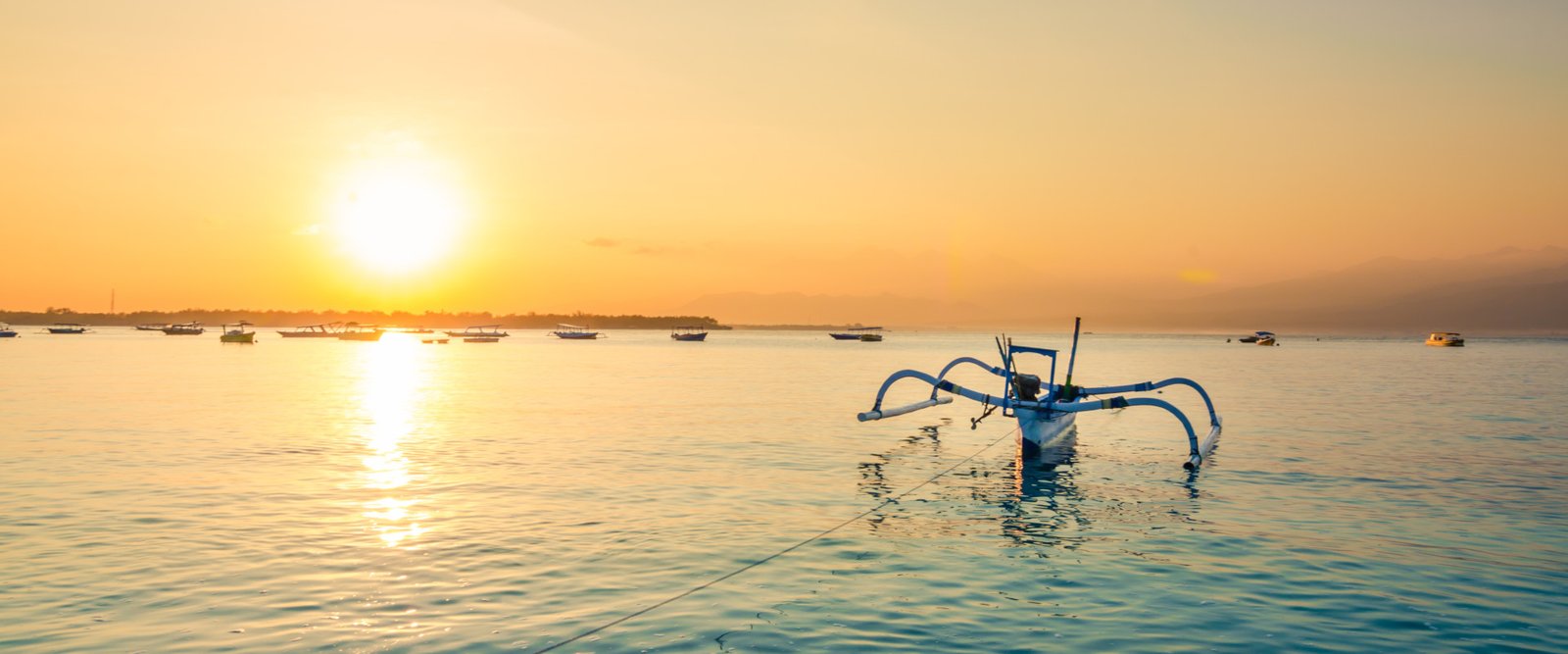The sea gives us another world. Explore this fascinating universe with Divine Divers.
The Gili Islands are not only a vision of paradise but also one of the top diving destinations in Indonesia. Situated in the famous coral triangle, with more than 20 dive sites and a plenty of diverse underwater environments. Located off the northwest coast of Lombok Gili Air, Gili Meno and Gili Trawangan are surely a diver’s heaven where undoubtedly turtles are starring the show. Both green and hawksbill turtles are abundant.
The dive sites of the Gili Islands have a great marine diversity with sought after critters like ornate ghost pipe fish, frogfish and nudibranchs. But also reef sharks are frequently spotted as well as octopus along with tuna, barracuda, trevally and occasional passing eagle rays. Among the hunters you will find colourful tropical reef dwellers such as sweetlips, pufferfish, angelfish, batfish, butterflyfish, lionfish, scorpionfish and schooling snappers, fusiliers and damsels. Oh and did we mention the turtles?
Overall, the Gilis offer great diving all year round with the dry season running from May to October and the rainy season from November to April, but it doesn’t really rain that much and the diving isn’t affected by the rain.
Divine Divers is located on central Gili Meno. This gives us easy access to all of the Gili dive sites within a 10 minutes boat ride, with many of the most famous sites right in front of our doorstep. Our daily fun dive trips are open for all levels of certified divers. They are guided underwater exploration tours and you will get to see the best of the dive sites with an experienced divemaster. Due to prevailing currents, most Gili dive sites are best seen on a drift dive from a boat.
Dive sites are chosen daily for the next day. Our boat leave three times a day at 08:00, 11:00 and 14:00. Throughout the week, we also schedule night dives. By leaving half an hour earlier than everybody else, we ensure that we have the beautiful dive sites to ourselves because we will resurface once the other dive boats turn up. Our boats are traditional Indonesian outrigger boats with a spacious sundeck. After your dive, you can dry off, sunbathe and enjoy the spectacular view.
Once back in the dive center, you will log your dive together with your group and your dive guide to not forget the amazing fish you have seen.
If you haven’t dived in a while, we recommend you to start your diving holiday with a quick refresher. Oh, and we of course also offer night dives. They are scheduled regularly throughout the week.
PERSONAL SERVICE
EXPERT GUIDES
3 DIVES PER DAY
SHORT BOAT RIDES
MAX 4 DIVERS PER GUIDE
GROUPS BY EXPERIENCE LEVEL
LONG DIVES
WASHING SERVICE
SAFETY EQUIPMENT ON BOATS
BOAT FOLLOWS DIVERS
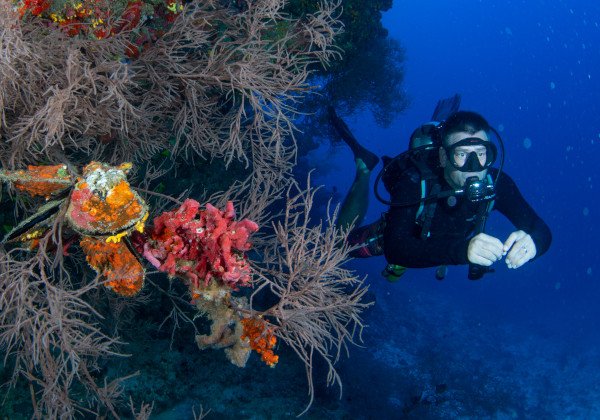
all certified divers, 1 guided dive including equipment and boat ride.
Single Dive
IDR 590,000
5 Dives
IDR 2,655,000
10 Dives
IDR 5,310,000
Every time you dive, you hope you’ll see something new — some new species. Sometimes the ocean gives you a gift, sometimes it doesn’t.
– James Cameron.
A diving day does not necessarily end when the sun goes down. On a night dive you’ll have the chance to meet the incredible marine life that only comes out when it is dark. We offer regular night dives around the Gili Islands. Just keep an eye on the sign for the dive sites of the day or simply let us know if you’d like to go night diving. We have Meno Wall, one of the best Gili night dive spots in front of our beach and can jump into the water at any given time.
Night diving might seem scary at first but it is one of those things that you’ll most likely end up loving. Night dives are open for all certified divers. If you have never done a night dive before we recommend you to do an Adventure Night Dive. For this dive, you will have an instructor by your side who will teach you the knowledge and techniques for night diving. If you are a seasoned (night) diver you can simply join a group or even try out fluo night diving using UV light.
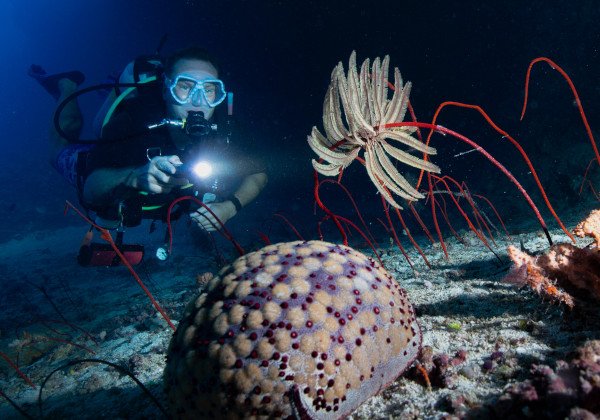
all certified divers, 1 guided night dive including equipment, torch and boat ride.
Night Dive
Dear ocean. Thank you for making us feel tiny, humble, inspired, and salty…all at once
– Anonymous.
Fluorescence night diving is also referred to as UV diving, blue light diving, fluo diving or glow diving. Divers are equipped with a yellow mask filter and a special light with which they conduct the dive. Some people say that fluo diving is like being in the movie “Avatar”. Others describe the experience as diving in a psychedelic rave party. We could bore you know with a chemical explanation but bottom line is: Fluo night diving is a whole new experience. The underwater world seems to glow but with colors unlike those seen by the naked eye in daylight or at night with a normal dive torch. Marine life that appears dull and gray during the day might look like a riot of colors at night. A pale piece of coral is now fire red and a glowing beauty of form and color. Convinced? Then join us for a once in a lifetime experience.
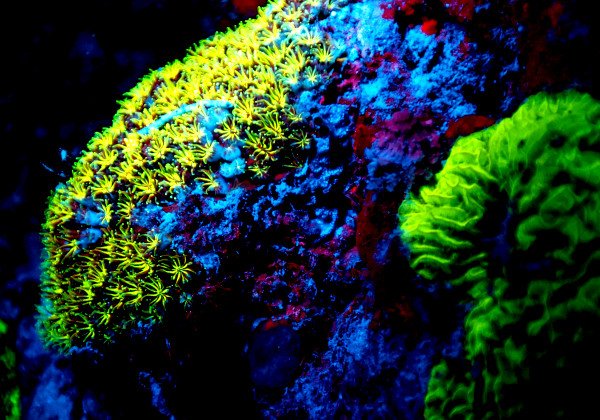
all certified divers with night diving experience, 1 guided blue light night dive including equipment, UV torch and boat ride.
Flou Night Dive
It was the possibility of darkness that made the day seem so bright.
– Steven King
Once all of a sudden, a year has passed and even though you’ve planned the entire time to go diving, it just didn’t happen. Knowledge can get rusty and if you haven’t dived in a while, we strongly recommend to reactivate your skills with a refresher program. A quick review of the dive theory, followed by some quality time in our pool and you are ready again for the open ocean. You will find yourself more relaxed and comfortable to back roll into the sea on the subsequent fun dive. In addition, your air consumption will be better after the pool session and you will enjoy the dive a lot more than without. The scuba skills update is available for all certified divers. The price for the refresher includes all 3 parts: theory, pool and open water dive.
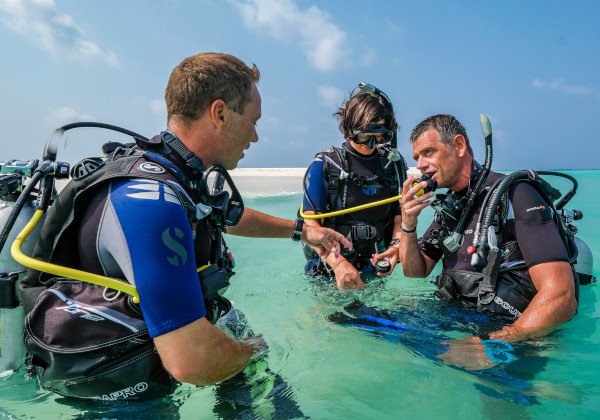
all certified divers, 1/2 day, 1 pool dive, 1 ocean dive
Refresher Course
Most of the problems in scuba diving come from ourselves.
– Jim Crockett
The minimum age to get a diving certification is 10 years. With that Open Water certification, the depth for 10- and 11-year-olds is restricted to 12 meters and they need to be accompanied accordingly.
As for the upper limit: There is none! If you are not sure if you are still fit to dive (based on your age) it makes sense to consult a doctor before signing up for fun dives. However, there are divers that are 80 years of age who are in a better physical condition than a 40-year-old. So being healthy isn’t necessarily an age thing.
In some areas, a medical examination is mandatory for all divers by law. In other places all divers (certified or not) have to fill in a medical questionnaire before engaging in any diving activities. This is not the case in Indonesia and hence also not on the Gili Islands. You are required to fill in a medical questionnaire only if you are signing up for a course. The medical questionnaire covers your state of health and asks about conditions, illness or medications that could be a problem when diving. If you are perfectly fit and healthy, you can sign the questionnaire and go diving. If the questionnaire highlights an issue, or if have to answer one of the questions with a “yes”, you have to consult a doctor before diving.
For fun diving this is not necessary though. You won’t have to fill in a medical questionnaire but you should still be healthy. If in doubt, it is always better to quickly check with a medical expert.
The longer the time interval between diving and flying, the better. In general, one should not dive at least 18 – 24 hours before flying. Please also read the conditions of your travel insurance carefully. Some require a minimum time after diving and before flying.
Safety is the top priority when diving, here are some of the most important rules:
On some occasions we will just walk into the sea to conduct a housereef dive. Due to prevailing currents, our divers are still accompanied by the boat. Not every exit point is suitable to simply walk back to the beach and it is easier and safer to get back on the boat. All housereef dives are guided. Solitary diving in buddy teams is not possible with Divine Divers on the Gili Islands. If you’d like to do your own thing, we can simply send a guide to accompany you. This is for your own safety. Currents can be very strong and we try to avoid having to pick you up half way to Bali. Better safe than sorry…
Renting equipment from a dive shop is a great way to save money. Our equipment is regularly maintained and exchanged as soon as it is in a condition that we don’t feel comfortable with. Masks and mouth pieces on snorkels and regulators are disinfected after every use. All equipment is washed and rinsed after every dive and then hung to dry. So yes, it is safe to rent dive gear at Divine Divers.
Enriched Air Nitrox (also called EAN or EANx) is a gas mix of nitrogen and oxygen. The mixture has a higher percentage of oxygen than normal air (usually 32% of oxygen instead of 21%). When diving with Nitrox, the accumulation of nitrogen in the body tissues is slowed down. Consequently, the no decompression time at intermediate depths in between 20 and 30 meters is extended. Nitrox tanks are usually highlighted with yellow-green colour stickers and labelled “EAN” or “NITROX”. Before the dive, every diver checks the oxygen content in the tank with the help of an O2 analyser. Let us know if you’d like to dive on Nitrox. Some dive sites such as Deep Turbo, Simon’s, Soraya, the Glenn Nusa and Deep Shark Point are a lot better with it than without because you can enjoy the dive site a lot longer before having to shallow up to avoid a decompression dive. Nitrox fillings are offered at a small surcharge for qualified divers.
The general rule in diving is: Always start the dive against the current and return to the entry point with the current. On the Gilis we mainly conduct drift dives since the current is often too strong to go against it. With a drift dive, the divers are dropped so that they can drift along the reef and then be picked up by the boat at the end of the dive. If you’d like to receive proper drift dive training, we highly recommend a Drift Specialty Course. It’s fun and you learn some more handy skills for current and drift dives in the future.
Most people are a little nervous before their first night dive. Those who have tried night diving are usually totally thrilled. At night, a completely different underwater world is waiting for you. Many creatures are active only in the evening or behave differently than in the daytime. If you have never done a night dive before, we recommend you to do an Adventure Night Dive to learn the bits and bobs of safe night diving.
You think you have seen it all? Then try a blue light night dive and we promise you that you’ll have the sensation of WOW again!
Yes, diving with contact lenses is possible. However, soft contact lenses are more suitable for diving than hard contact lenses. Alternatively, and if you’d like to pick up diving on a regular base, a diving mask with optical glasses is also not a bad idea.
Diving tanks are available in steel or aluminium and in different sizes. If you dive in a European lake the heavier steel tanks are mostly used. In salt water aluminium makes more sense because the material doesn’t rust as fast. Divine Divers Gili Meno uses 12 litre aluminium tanks.
When people talk about recreational diving limits, they tend to consider depths first and foremost. Most courses have clearly specified training depth limits:
YAYY! Sharks are amazing marine animals. Encounters with these graceful creatures are both rare and highly sought after by divers around the world. Despite common believe which is unfortunately highly influenced by Hollywood, sharks are not mindless killing machines. Attacks on divers are very rare. Mostly, sharks will swim away as fast as they can once you as a diver approach. Here on the Gilis, you may get to see a sleeping white tip reef shark underneath a coral block for an extended period of time. Sharks can often be found at Shark Point and Sunset Reef.
White sandy beaches, crystal clear and warm waters with temperatures in between 28 and 29 degrees, the reef on your doorstep and a great lifestyle – does this sound like paradise to you? The Gili Islands are a postcard image of paradise and known as the turtle capital in the world – rightfully so, because both green and hawksbill turtles are abundant. Reef sharks are also frequently spotted and there is a broad range of marine life to be met on all dives. Thanks to Divine Diver’s central location on Gili Meno, the dive sites are hardly more than a 10 to 15-minute boat ride away and diving is great all year round. The dry season is running from May to October and the rainy season from November to April. Rainy season sounds more extreme than it actually is because it hardly ever rains an entire day and the diving isn’t really affected by it.
When you received your last certification card, you were certified for life. In theory you could just go to a dive center, rent some tanks and go for a shore dive. Despite the fact that rental gear and non-guided shore diving isn’t offered on the Gilis, this is also not a smart idea. If you have not dived in a long time long your skills will have gotten rusty. It is the best course of action to take a refresher lesson. According to some dive organizations, divers who have not dived in six months needs to take a ReActivate (PADI) or Scuba Skills Update (SSI) course.
We at Divine Divers Gili Meno believe that those statements are a little too broad. We will first look at your dive experience, your comfort level and the time out of water. Only after an initial evaluation, we will recommend you to enrol into a refresher course or not.
As a general guideline: we recommend refresher training after 12 months of not diving. However, we also believe that very experienced divers who have not been diving in a while are usually their own best judge if they need a formal course to regain their scuba skills or not.
Our students and discover divers are covered in the insurance plans of our instructors. However, fun divers are not. A diving accident insurance is optional but recommended. As in every sport, there are certain risks associated with diving. In case of a diving accident, not all (but many) insurance companies cover the costs of a decompression chamber treatment. It makes sense to check with your insurance company if you are covered in the unlikely event of a dive accident. If you are not, we recommend an insurance policy by DAN, Aquamed or DiveAssure. There are also short term plans available for one week or even one day. Talk to us if you are interested. We will gladly help you!
To dive with a flu or cold is not recommended. When you are ill the upper respiratory system swells, becomes congested with mucus and often the eustachian tubes and sinuses become blocked. Ears, nose, and lungs have to work properly, otherwise, it is not safe to dive.
Our fun dives around the Gili Islands are guided, all-inclusive underwater explorations tours conducted from a traditional outrigger boat. Before the dive, you will receive a briefing which covers the layout and procedures on the boat, the type of entry and exit, the length of the boat trip, the dive site, what we expect to see and other aspects. We dive in small groups with no more than four divers per guide. The boat trip, guiding fee, equipment (with exception of the dive computer) and the dive itself is included in the dive price. Should the tide be very low, we will transfer you to the dive boat with a small shuttle boat. This shuttle service if of course also included in the overall price. Not only will be assemble your dive equipment before your dive, but we will also wash and store it for you after your dive. The only thing we will ask you to do is to take your dive gear (excluding the tank) off the boat and hand it over to our dive center crew after the dive. Since the distances from Gili Meno are short, we return to the dive center after every dive.
Please bring a towel and something to drink and a good mood.
On requested, we offer two tank dives to the muck dive sites at Teluk Nara in Lombok. Two tank means that we don’t come back to the dive center in between dives. We will take two tanks per diver and we will do the surface interval on the boat. The boat will return to the dive center after the second dive.
In short: No, we don’t.
A dive that goes beyond non decompression limits is called a decompression or deco dive. Decompression diving is when a diver is required to make one or more stops during their ascent to give their body time to safely release the nitrogen that dissolved into their tissues during the dive. In general, recreational scuba diving is non-decompression diving and the “normal” diver is not certified to conduct deco dives. That is rather something for tech divers and requires special training (and/or equipment)
In water the body cools much faster than on land, so basically: better to wear more, than to freeze in the water. The colder the water, the thicker the neoprene suit should be. The values given here are influenced by personal perception, duration of stay in water and air temperature. Ultimately, every diver has to decide which suit is right for him. Many of our guides dive with no wetsuit at all, others dive with a 5mm long suit. We offer 3 mm shorties to all our divers. If you’d prefer something long or thicker, you will have to bring your own wetsuit with you.
DIN and INT are two different types of valve systems.
If you bring your own regulator, you don’t have to worry. We can cater for both types of valve systems and also have adaptors for rent as well (free of charge).
Non-divers are most welcome to join a boat trip if the conditions allow and the boat is not too full. However, snorkelling in general is not possible from the dive boat. Since most of our dives are drift dives, the boat needs to follow the divers to ensure their safety. The risk of not being able to look after both snorkelers and divers is too great so we kindly ask for understanding. We gladly refer snorkelers to the local snorkel operators.
Diving in rather murky, sandy or muddy waters – often near the shore or in a harbour – is referred to as muck diving. You’re unlikely to see corals, but these dives are a mecca for photographers and lovers of rare and fascinating sea creatures (for example hairy frogfish or blue-ring octopuses). Indonaesia offers world class muck diving and Gili Air Harbour and Teluk Nara a great muck dive sites.
No, as soon as you are aware of your pregnancy, diving is off the agenda. The possible risks to the unborn child are unresearched and unknown.
Yes, if you feel comfortable and do not take any serious pain medication, diving during your period is no problem. Sharks are not lured in by human blood, they are only attracted to fish blood. Hence, it is totally safe to go diving.
There are only a few dive sites around the Gili Islands that are not suitable for Open Water Divers. The general reason for this is that the reef top or average diving depth is deeper than 18 meters. Those dive sites are: Deep Turbo, Deep Halik, Jack Point, Glenn Nusa Wreck and Simon’s. You’d still like to go? You can deepen and extend your knowledge onsite with so-called specialties or in the Advanced Course.
Scuba Divers are certified to dive to a maximum depth of 12 metres and only under the supervision of a Divemaster, Assistant Instructor or Instructor. This may lead (in some cases) to limitations in the selection of dive sites. However, you can take an additional course to get an Open Water certificate or simply join a course dive that goes no deeper than 12 meters.
There is a lovely dive site that some dive shops call Manta Point. This is not for the great abundance of manta rays and often confuses people who expect to see the gentle giants there. We call the dive site Sunset Reef, because of the beautiful sunsets that can be observed from there. It is located south of Gili Tranwangan.
We love what we do and we do it well! We have been in the diving game for over 10 years as Divine Divers on Gili Meno but our passion for diving didn’t start there. During our long careers in the diving, we have seen a lot and dived all over the world. Sometimes you come to dive centers that just have the little extra. A place you enter and you feel instantly at home. Being surrounded by likeminded people in a chill yet professional atmosphere. This is exactly what we had in mind when setting up Divine Divers.
Apart from that we are located in paradise and at the most beautiful spot on Gili Meno – sunset beach. Our groups are small and our instructors hand chosen for their personality and excellent teaching records. Safety is our primary concern; our equipment is in excellent order and of course regularly maintained. We are committed to offering first-class service and superior quality dive courses.

